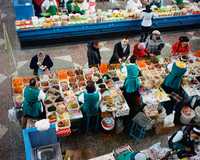Kazakhstan / Astana
Reportage 1. A tale of two cities: Kazakhstan
Visits to Kazakhstan’s capital and its predecessor reveal a large discrepancy in investment but some shared conundrums: are they part of a country that can survive with President Putin circling – and is it even a country?
Winter has arrived in Astana and it is unlikely to leave for another four months. The temperature has dropped to minus 12c and the snow, freshly fallen the night before, comes up to the shins. Men in warm coats and fur hats tackle it with shovels; sparkling suvs slowly glide past along the newly cleared roads. The low sun, weak and pale in a clear blue sky, provides little warmth. It is only sensible to keep your head down but Astana is a city that demands you look up, if only to work out what on Earth is casting that bizarre shadow.
Astana is someone’s idea of what the future will look like, the same someone who gave us the architectural beauties that are Dubai, Abu Dhabi, Doha and Baku. It is a city where architects have been given plots of land, no planning rules, no price limit and no need to consider a city’s soul.
The result can best be seen at the top of the Bayterek, a 105-metre-high tower that resembles an oversized trophy for a second-rate regional football tournament. The viewing platform attracts a smattering of visitors: a Chinese migrant from Urumqi pointing out the expensive Chinese hotel he used to work at and four women in their eighties wearing fur coats and headscarves. Each takes their turn to place their hand in the gold-plated handprint of President Nazarbayev that rests on a plinth in the centre. (This handprint is something of a Nazarbayev hallmark: it’s on every banknote, too. In Kazakhstan the president always has his hand on your money.)
Bayterek is in the heart of the new Astana, right in the centre of the wide Nurzhol Boulevard. To the east of the tower, down the long road, stands the presidential palace, a beige-and-light-blue version of the White House. To the west, at the opposite end of the street, there appears to be a poor replica of a spaceship; it is in fact the Khan Shatyr Entertainment Center.
What does this say about the modern Astana? The presidential palace and the shopping mall, both designed by Foster + Partners, staring each other down from two ends of the same road. And between these modern-day palaces are yet more architectural oddities. Two squat shining gold towers dubbed the “beer cans” stand on either side of the road. There is a pyramid of peace; further off to the southeast, a concert hall that resembles a series of waves crashing against the hull of a ship.
Beyond the gleaming centre lies the old city. Most of those who work here – the lift operator, the waiter at the Chinese hotel, the taxi drivers milling outside the Khan Shatyr – live across the snow-covered river. The tower blocks there are Soviet, not Foster. In the distance the industrial chimneys of a power plant belch out white smoke.
We walk on to the mall, a building that looks even more surreal up close. Inside it is like every other mall in every other town in the world: the same brands, the same music pumped over the public-address system, the same lifeless, uninspiring food court on the top floor. At least the food court is popular: all the tables at Burger King are taken. Downstairs, the shops are empty. A handful of families wander past, window shopping, and a couple of young women poke their head into Mango but that’s pretty much it. Granted, a Tuesday lunchtime on the first cold day of the season isn’t going to be the busiest period but this is the biggest shopping mall in the capital city and it’s all but deserted.
Beyond the shopping centre, new developments are being built. The computer-generated image on the side of the site shows shiny luxury towers in the glimmering sun. More blocks are nearer completion further out – this is the social housing, apparently. Afghan veterans and pensioners will be given free homes – at least, that’s what we’re told.
We drive out of town, north. The towers and construction sites disappear, replaced by little but a flat expanse of land covered in thick snow, through which a muddy grey streak of a single-lane highway slices. After 30km, a series of outhouses appear on the right and, next to them, dozens of horses trying to graze, noses buried in the snow. The stables hold 150 of them in total but these are not for riding. “For meat,” says Sabir Hasanov with a grin. Originally from Uzbekistan, Hasanov has travelled through the periphery in search of work. His last job was in eastern Ukraine, trading dried fruit. Then came the war: “I fled,” he says, smiling again and shrugging. He’s been in Kazakhstan a month. He’ll stay as long as he has a job then, who knows, maybe back to Uzbekistan. One of the five others working at the stables is Uzbek too; the others are local. The work is work: 10 hours a day, all the hours of daylight. Hasanov doesn’t go into detail but the abattoir is on site, too. As we leave we step over a severed goat’s head lying in the snow. The farm’s dog, a dirty white malamute, begins to gnaw at it.
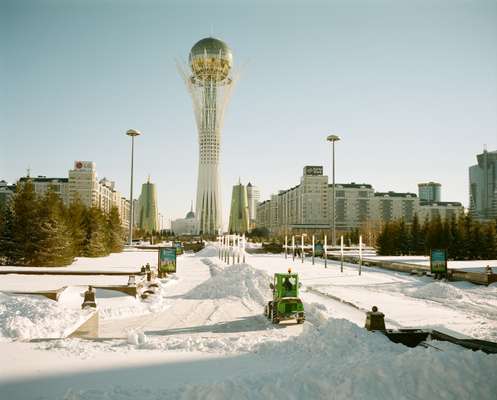
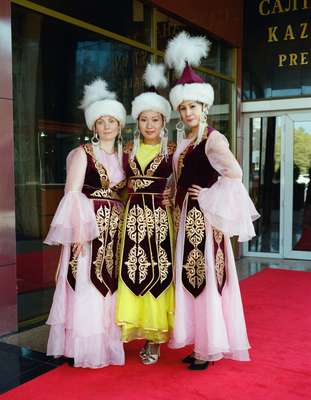
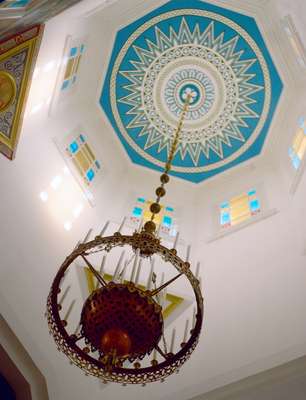
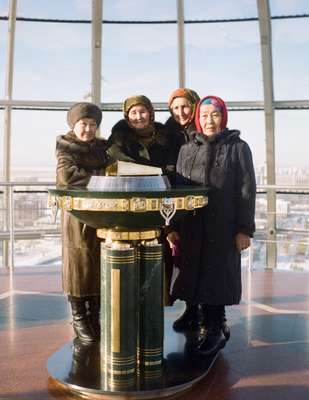
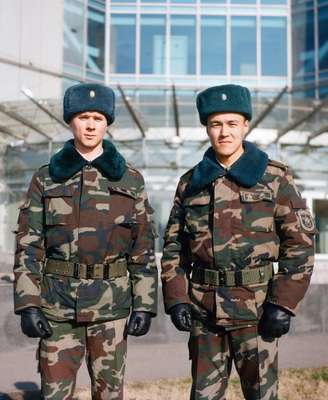
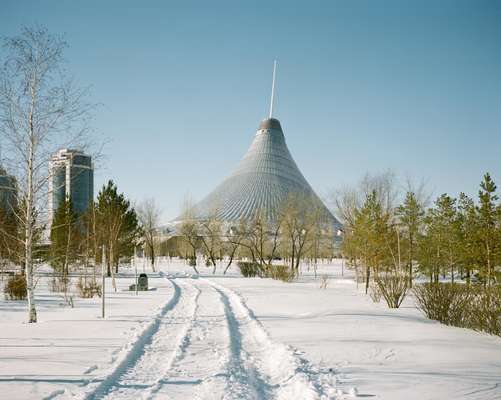
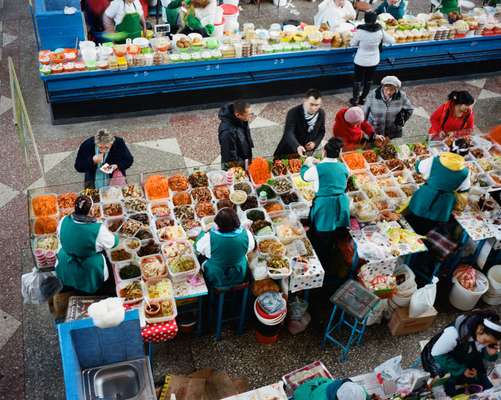
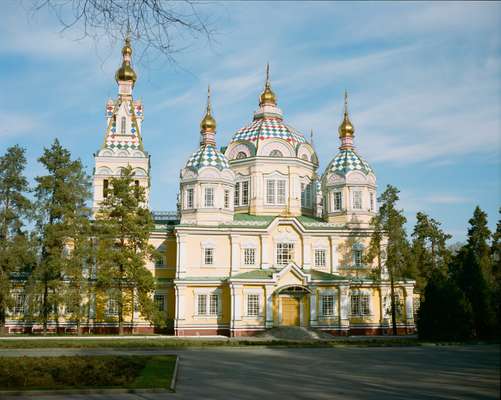
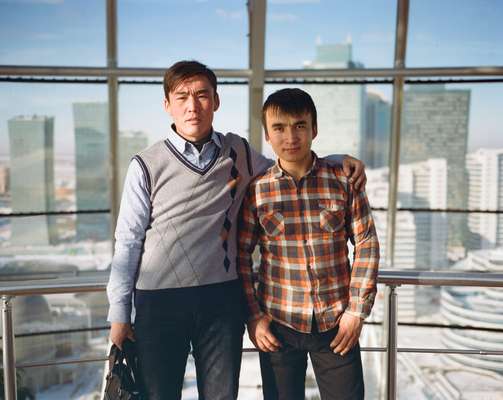
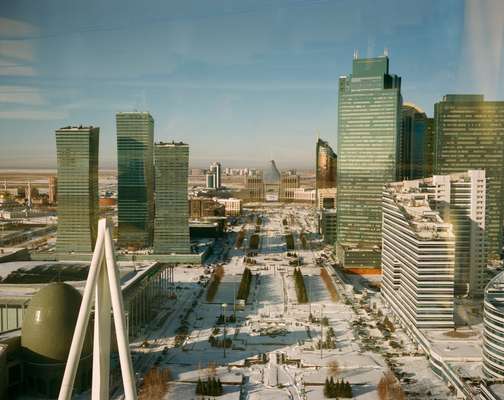
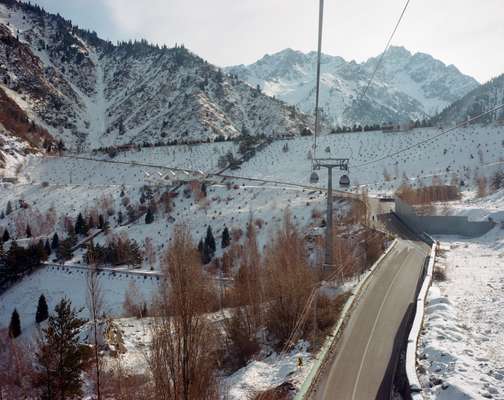
In the last days of summer – with Crimea once more part of Russia, Kremlin-backed separatists tearing apart eastern Ukraine and every comment from Moscow being analysed for evidence of president Vladimir Putin’s intentions – the Russian leader turned up at a youth forum to answer a series of pre-approved, probably Kremlin-written questions. One questioner pointed out that every mention of Putin during the preceding two-day conference had been positive. What did he think of that? (Putin was happy.) Then a woman called Anna Sazonova from the Peoples’ Friendship University of Russia took to the floor.
“Everybody is talking about nationalism in Ukraine nowadays,” she said. “However, we are concerned about a different situation, namely the growth of nationalistic sentiments in Kazakhstan, in the south of that country in particular. In our view the president, Mr Nazarbayev, is the main restraining factor here. Our question is should we expect developments in Kazakhstan to follow the Ukrainian scenario should Mr Nazarbayev leave his post? Is there any strategy designed to prevent this?”
Ms Sazonova then complimented Putin on his cardigan and handed back the microphone. Putin smiled, thanked her for the kind words about the cardy, then proceeded to politely undermine Kazakhstan’s very existence. Nazarbayev, he said, “has performed a unique feat: he has created a state on a territory where there has never been a state. The Kazakhs never had a state of their own and he created it.” As if that wasn’t enough, Putin claimed that the “vast majority of the citizens of Kazakhstan favour stronger ties with Russia” and Nazarbayev “would never go against the will of his people”. In Astana there was quiet fury.
Kazakhstan, a vast expanse of land five times the size of France with, at 17 million, a quarter of its population, stretches across central Asia, sharing two long borders with Russia and China. It may trade equally with both powers (China is the biggest export destination; Russia is where the most imports come from) but Kazakhstan’s links to Moscow are far stronger. The departures board at Almaty Airport tells its own story. A dozen flights to other parts of the former Soviet Union, plus three more to Delhi, Istanbul and Dubai; none to China.
Those economic ties to Russia should become stronger in 2015. Putin’s grand project, the Eurasian Economic Union, officially begins in January and Kazakhstan will be a founding member. Given the events in Ukraine, plus the fact that one fifth of Kazakhs are ethnic Russians, it is no wonder that Kazakh leaders are approaching the union with caution. Putin is not the only one who wonders whether Kazakhstan will remain as it is when the 74-year-old Nazarbayev, the man who through his own cult of personality embodies the idea of Kazakh national identity, finally leaves power – however and whenever that may be. It certainly won’t be via the ballot box. At the last election in 2011, Nazarbayev won 95 per cent of the vote; something he achieved, according to the claims of the osce, thanks to ballot-box stuffing and voter intimidation.
On paper, Kazakhstan has everything a nation could need: its own flag, national anthem and currency (the tenge); a government and a capital city; internationally recognised borders, armed forces; and UN membership. But Kazakhstan has no heroic founding story. It didn’t fight off occupation or rebel against a coloniser. Independence was handed to it. As the Soviet Union broke up, Kazakhstan found itself alone for the first time in its history.
Nor was there a new generation of politicians to replace the Soviet-backed leaders. Nazarbayev had spent the past 30 years climbing the Communist party ladder, culminating in his appointment by Mikhail Gorbachev as first secretary of the Communist party of the Kazakh Socialist Soviet Republic in 1989. In that time he had displayed little appetite for Kazakh nationalism. In 1986 there were four days of protests against the appointment of an ethnic Russian as first secretary. Thousands were arrested, hundreds tortured and an unknown number were killed. Nazarbayev’s role in the crackdown has never been explained and while the events are officially commemorated, they receive little publicity.
Now though, Nazarbayev is happy to talk about national identity; it is the way he tries to bind his country together. Astana, the strange new capital in the middle of the desert, is part of that national rebrand. So too is the airline, Air Astana, with a young fleet of 30 Airbuses and Boeings. The name, though. Kazakhstan. Easy for some to mistake it for Kurdistan. Or Kyrgyzstan. The president’s not a fan either. In February 2014 he proposed changing it to Kazakh Yeli (Land of the Kazakhs). The suffix “stan” was, he claimed, turning off tourists. (Having spent a bit of time here we can think of one or two other things that might prevent tourists choosing to holiday in Almaty or Astana.)
Nzarbayev indirectly responded to Putin in mid-November. The last portion of his state of the union speech was devoted to the idea of Kazakh identity, tying together the ethnic Russians as well as the Uzbeks, Uighurs and more than a dozen different ethnic groups that live inside the borders. “We must safeguard our unity and our interethnic harmony. No outsider can come and do this for us,” he said. Judging by the teenagers outside the Mega Mall in Almaty, Nazarbayev won’t have much trouble convincing those born after the fall of the Soviet Union to take pride in their Kazakh nationality. Where Astana, or parts of it, glisten in the sun, there is little in Almaty to excite an architecture student or an urban planner. Almaty was the original capital and while it has been starved of the money and attention lavished on Astana in the past two decades, it has a few advantages that Kazakh tenges can’t buy.
Close to the eastern border with China, it has a far better climate, more beautiful scenery and a larger, more educated population. The south side of the city is flanked by a glorious snow-covered mountain range; inside the city, the mountains always seem to be just at the end of the road even though you never quite reach them. On the highways there are suvs and brand new BMWs; there is also the occasional donkey cart and tractor to be seen.
Hanging outside the mall, as Adele is pumped out over the public-address system, four teenage girls talk about their Kazakh identity with far more pride than anyone else we meet. “If you dig deep into our history you will see we have achieved everything ourselves,” says Aigerim Adilkhanova, the most thoughtful of the four. “There are not a lot of countries in the former Soviet Union as determined as Kazakhstan.” All four want to study abroad – the US, says Saya Sagybdyk; Dubai says Arai Ersain – but they are equally clear that they want to return. “We will be more professional and developed,” says Adilkhanova.
Later that afternoon, in a park filled with Soviet-era war memorials, we meet a 35-year-old mother, Maral, with her one-year-old daughter. “Much has changed,” she says, comparing life now to when she grew up. “Now it’s a market economy.” For her, an accountant, there is no comparison. “I hope for a bright future. The main thing is peace – all other problems will be overcome.” I ask about politics. She smiles, says nothing, then as we leave decides not to give her last name.
This is a common response. Conversations quickly peter out once the topic of politics is raised. Silent smiles greet questions about democracy or relations with Russia. One self-titled “old man” is willing to criticise Nazarbayev. “He needs to go – he’s even older than me. What can he do now?” The issue of succession is whispered among diplomats. His daughters’ husbands have been touted in the past but none appear to be in favour now. Eight prime ministers have come and gone in 23 years; none have made a lasting impression.
Kazakhstan’s geography may suggest its most important relationships are with Moscow and Beijing but the country is increasingly turning to the West. A new privatisation programme is an attempt to bring in more western investment. In 2013, British prime minister David Cameron led a delegation of 30 British businesses to Kazakhstan to try to win a slice. He dismissed human-rights concerns, instead praising Kazakhstan as “one of the most rapidly emerging countries in the world”. If support for Nazarbayev makes life more difficult for Putin then many western leaders will be only too happy to help.
Nazarbayev’s western defenders point out that Kazakhstan is still a young nation. This is true. Life is better for most than it was under Soviet rule, they add. This is also true. Why any of this is an excuse for widescale repression, the jailing of opponents and the violent quelling of any peaceful protests is less clear.
There is something inherently depressing about all this. We have taken his money, gloried in his Potemkin capital, promoted him as a world leader. What of our principles? Of free speech? Of human rights?
Nazarbayev wants to be recognised as a global statesman. He wants Astana to be admired across the world. He wants Kazakhstan to be economically strong and independent. Squeezed between Russia and China, in a part of the world where the vote has never been a right, perhaps he should consider another legacy, one that will ensure all those other aims come true: the man who brought democracy to Central Asia. That would be something worth celebrating. That would be something worth marking with a gleaming capital.
On our last day in Kazakhstan we spot an advertising hoarding beside a highway flicking back and forth between two adverts. The first is for a new Nissan suv, the other is for a new film. It’s The Hunger Games. As we leave this rich capital surrounded by poverty, we wonder who will watch it and what they will make of it.
Steve Bloomfield has written for Monocle since launch (allowing for an unfortunate sub editor on issue one who rendered him Steve "Broomfield"). After a stint as our Nairobi correspondent we lured him back to London where he has been our foreign editor since 2010, a role that sees him helping shape much of our Monocle24 output, too. Steve reports widely but seems to have become our de facto Arctic correspondent and has rather too many pictures with reindeer.

